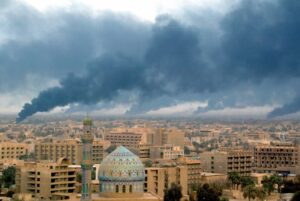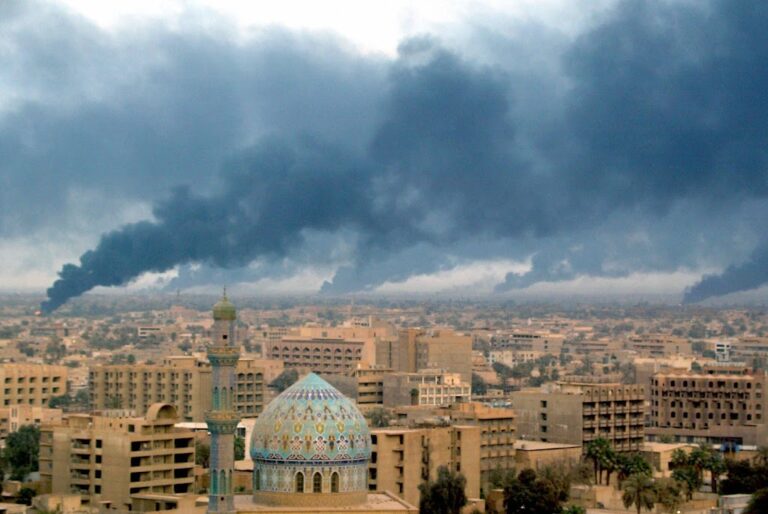 |
|
Smoke covering Baghdad, Iraq on April 2nd, 2003.
|
This past Wednesday (January 6th) was a day that
many Americans will never forget. It was one of those defining moments in time,
where years later you recall where you were and how you felt as you watched the
events unfolding. However, in my case those events unearthed a range of buried
emotions and past trauma, the sort of thoughts one must let out, as they eat
away at you if you imprison them within your head.
To set the scene, at midday I had decided to take a break
from work and do my usual 6-mile afternoon run—a ritual I developed years ago,
which acts as my daily ‘therapy’ session with nature and my own body.
Unfortunately, on my second mile as I jogged along while enjoying my music, my
serenity was interrupted with a stream of blaring police sirens.
Now living in DC, I am used to the usual sirens that come
with living in the nation’s capital, but the magnitude of these were different,
and much louder because of their high number. The kind of difference between
sitting next to one screaming child on an airplane versus thirty at once. As a
result, my dormant PTSD symptoms were immediately triggered and I was shaken to
my core in a fight-or-flight survival stance, that I thought I had exiled to my
mental recesses. That trauma was derived from growing up in war-torn Iraqi Kurdistan
and experiencing frequent nearby explosions and being surrounded by the
constant fear that at any moment, your “normal” day could be turned into a hell
on earth of fire and scattered body parts.
I was soon met with a series of vague text messages coming
from my former students and residents asking if I was running near the National
Mall, my preferred location. But none of them had offered the exact details of
what had occurred, which again created a flurry of thoughts in my psyche. Had
there been a terrorist attack? A mass shooting? A suicide or car bombing like
the ones I remember as a young child from back in my homeland? Of note, giving
someone who has buried trauma limited details in such situations can be the worst
option of all, as their traumatized imagination will immediately harken back to
those memories and fill in the void with the worst possible options.
All of the sudden I was not jogging along a nice path with
well groomed grass amidst white marble buildings, but I was a frightened young
girl running along a dusty dirt road in Iraq during Operation Desert Storm who
thought that the quicker I moved the less of a target I would be. All of the
sudden I was also that child of mass exodus living in a sanctioned country
without enough to survive, whose family fled to the sheltering mountains to
escape mass murder from Saddam Hussein’s regime.
When you grow up in a country of constant conflict and have
witnessed starvation, and the widespread looting and mobs that form out of a
means to survive, you never forget the look in the eyes of uncontrolled masses
who begin to move like a force of energy. But that sort of chaos is supposed to
happen in faraway “exotic” places, the countries most Americans cannot name or
find on a map, the scary places that end in “stan”, or that have important
resources that need to be “liberated” by Western Governments from the dictators
who rule over them.
The smoky skylines and shouts of angry mobs was something I
grew up with, but now it was here. It had found me in my sanctuary of
Washington DC, decades later, and I immediately began to notice the
similarities and drastic differences of such an event. The most obvious one was
the relative privilege of the rioters, in comparison to the people of true
desperation I remembered growing up. In my experience, charging into a public
building and breaking windows was either communal rage because fathers could
not feed their hungry children, or because oppressed minority populations had
reached their breaking point and were tired of having family members being
picked up by secret police, and disappeared or murdered—never to be seen again.
“Oppression” to my younger self, meant being a Kurd in a
nation where my language was banned, and where it was an official state policy
to carry out genocide on my people during the Al-Anfal campaign. Once you
survive an event where 180,000 of your fellow ethnic group are shot, gassed,
and buried alive in the desert, seeing middle-class Americans shout about the
tyranny of twitter blocks, or being made to wear a mask during a health
pandemic, start to feel absurd, comical, and insulting.
As a refugee who escaped a warzone and came to the US as a
teenager, seeing this mob charge into the American capitol building with rage
in their eyes was a puzzling experience. I had experienced real persecution
under Saddam, so when they shout into the news cameras about “tyranny” because
Costco doesn’t want them openly coughing on other customers, you realize that
some people do not realize how good they have it.
I also realized how a “brown girl” from the Middle East like
myself, lives in a different universe than many of these rioters who want to
burn this great nation down. I was raised to always be grateful for the
opportunity that America had given me and to hold my tongue on criticizing her
because any imperfections were outweighed by the life I had been given the
chance to earn. I had to always be on my best behavior, study the hardest,
dress the most professionally, and be everything that many Americans did not
expect, when they complimented me on my English upon finding out I was “from
Iraq”.
But, within these rioters I did not see faces that reminded
me of myself, but rather a mob of rage that likely viewed someone like me as a
“threat” or unwelcomed “immigrant”. Many of them likely did not like the
religion I grew up with, and likely had an idea that the people I grew up
around were all “terrorists”. Yet here they were, terrorizing the elected
representatives of their own Government, forcing them to run into hideouts,
while others were shot and trampled to death.
And I then wondered, what would the reaction had been if
this mob was a group of Muslims or Black Lives Matter protestors? How would
these same people react or what would they say? I would guess that it would be
some version of “the police should just shoot them all”. Yet they were punching
cops, chasing them up stairs, and beating one to death. They were clearly
carrying out domestic terrorism, but would they be viewed as terrorists? Or
would this be another incident where the media would tell us about how they
were driven to do this after being pillars of the community. Their past arrests
would not be the headline, but their past community service would be.
And as the stories began to roll, there it was. What I saw
was a mix of excuses and justifications. The President even called them
“special” people, the very people storming his own government buildings.
Luckily, I have also witnessed a needed shift in the way the media has started
to cover this situation. Many Americans are now realizing that terrorism comes
in many forms, and especially racial colors and religions. It is not a term for
“foreigner”, but the terrorists can live right here among us and look more like
an “American” than an “other”. It can be a lot to digest during an afternoon
run, but all I can do is keep jogging.


